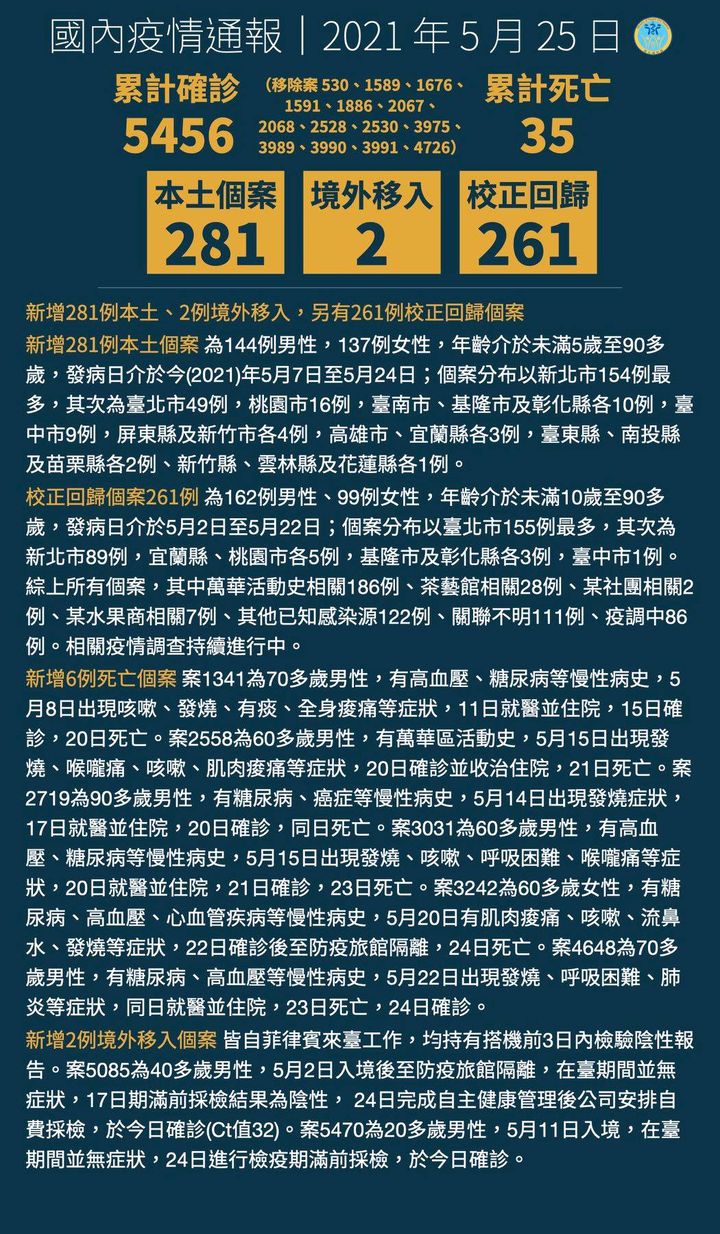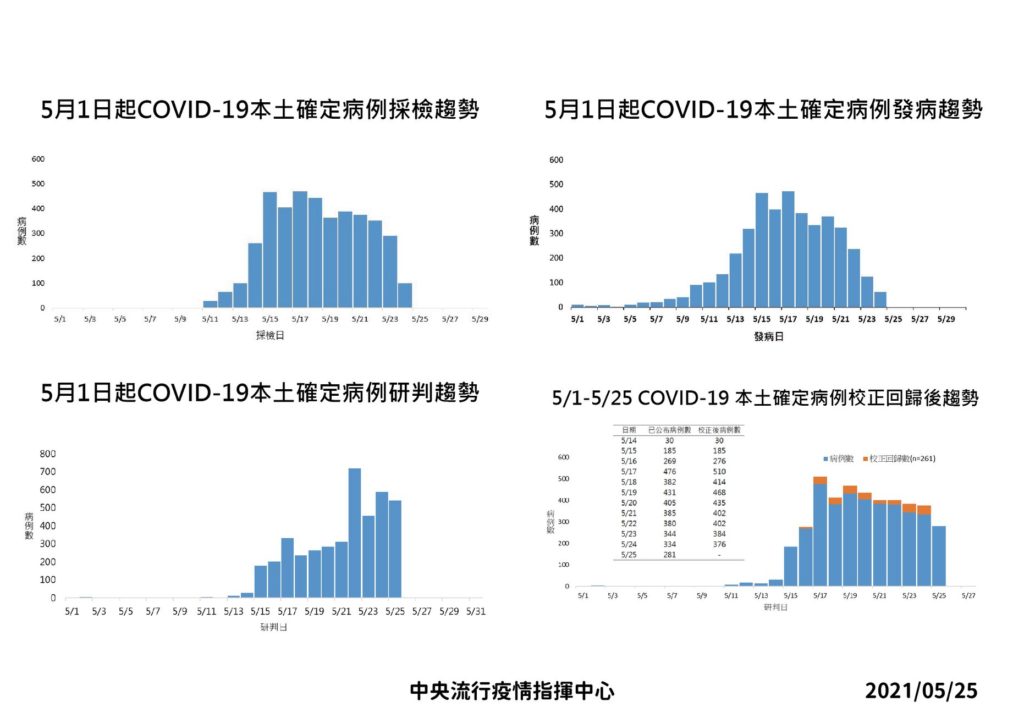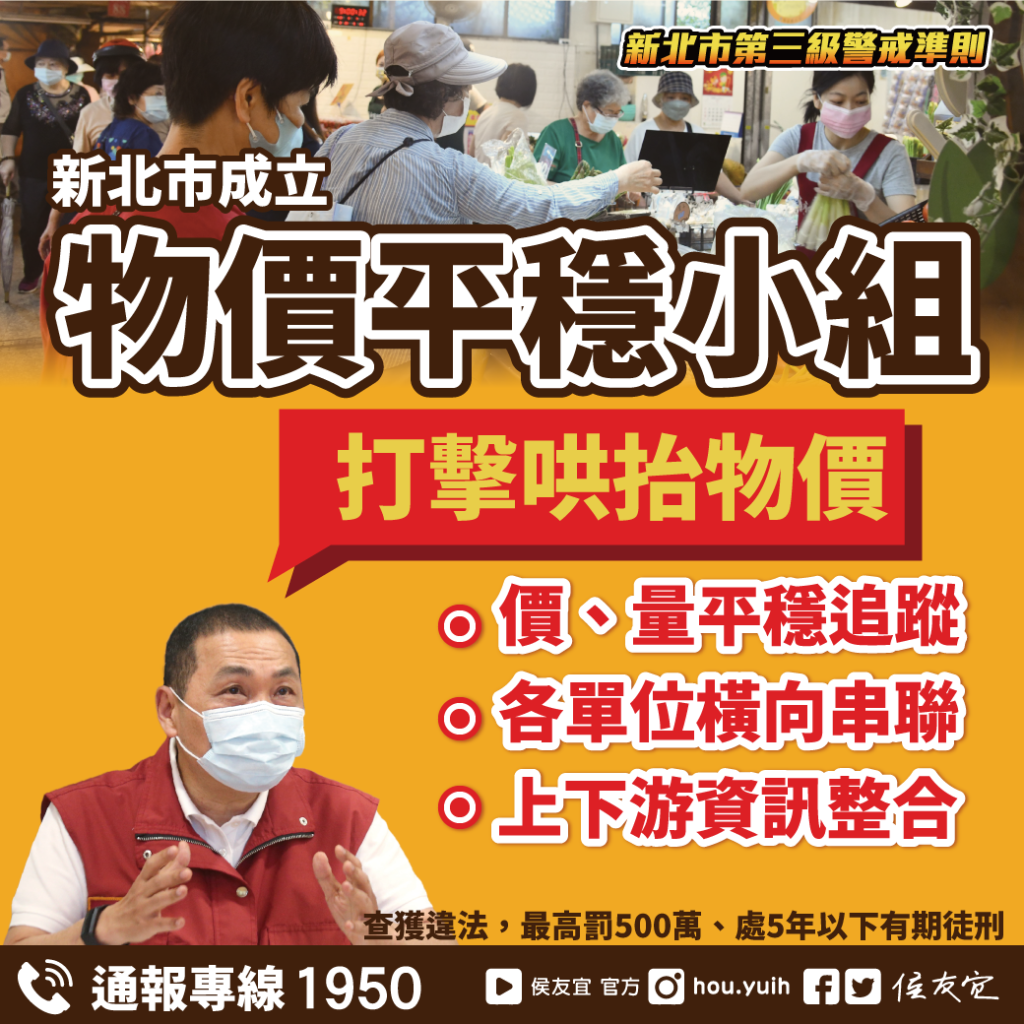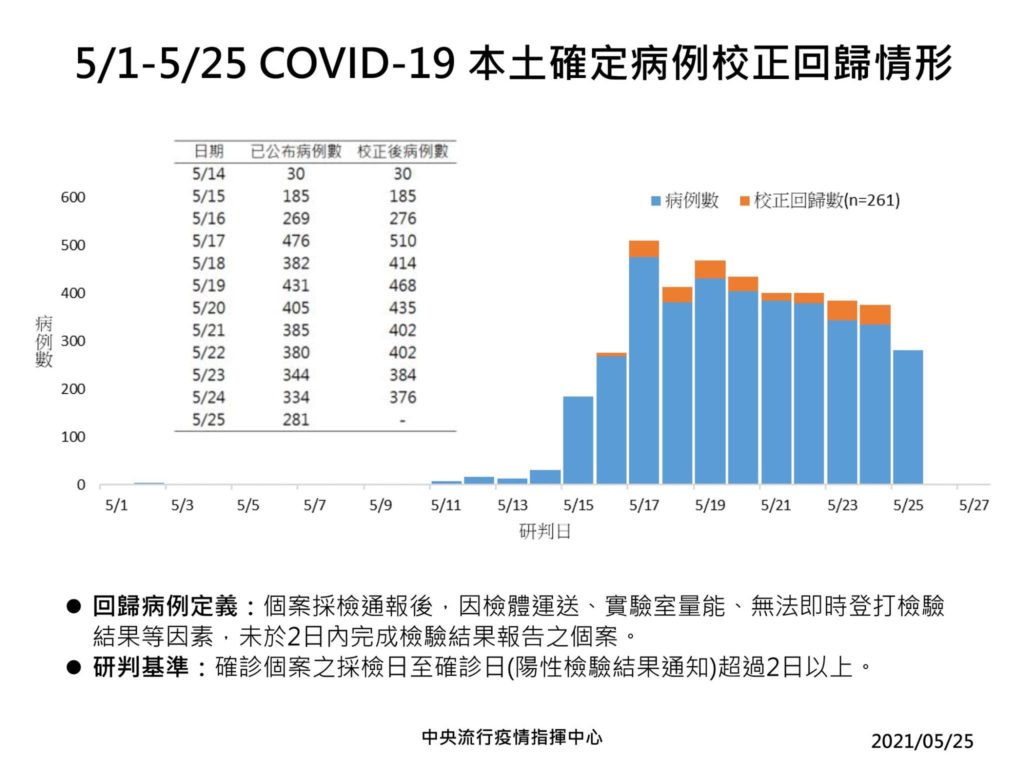by Brian Hioe
語言:
English
Photo Credit: mailer_diablo/WikiCommons/CC
AT THE DAILY press conference held by the Central Epidemic Command Center (CECC) this afternoon, 281 domestic cases, two imported cases, and six new deaths were announced. This continues the third consecutive day of six deaths announced per day due to COVID-19. 261 cases from the backlog of processed tests were added to the past week’s counts. The CECC previously asked media outlets not to aggregate numbers from cases from the backlog and new cases together to avoid panic about a one-day jump of COVID-19 that would not reflect actual conditions. But Minister of Health and Welfare Chen Shih-chung phrased this today as having over 500 cases and this is reflected in the CECC’s infographics.
With much anticipation ahead of time that the CECC would announce a two-week extension of the current level three status, the CECC announced that the current level three alert would be extended to June 14th today. The current level three status was originally set to last until May 28th. As the CECC’s extension is actually a 17-day extension of the level three alert status and not a two-week extension, this is probably because the CECC does not want members of the public going out over the Dragon Boat Holiday weekend, as they would likely do if the level three status ended two weeks after May 28th on June 11th.
Infographic about the continuation of school closures. Photo credit: Ministry of Health and Welfare/Facebook
School closures will be extended until June 14th, with classes continuing to take place online. All graduation ceremonies will be canceled or moved online. Make-up examinations for high school exams will still take place, since this only involves 186 students in Taiwan, and 441 Taiwanese students in China. In light of frequent disconnections of online classes, due to a high number of users, the Ministry of Education will devote more resources to remote teaching. Measures will be implemented to ensure that final exams can be carried out smoothly.
Businesses have been called on to divide up shifts and maintain remote work arrangements. With the Ministry of Labor having rolled out 30,000 NT relief stipends last year, plans are under way to dispense further funds to provide assistance. The Legislative Yuan is expected to approve a 210 billion budget for COVID-related emergency measures on Monday. At least New Taipei has publicly stated that it will prepare for businesses being closed.
To this extent, the CECC declared that it expects to receive 2 million vaccines next month, and ten million vaccines by August today. This would bring Taiwan’s total doses of vaccines to just short of 13 million, seeing as around 700,000 doses of the AstraZeneca vaccine have already arrived.
When asked about which brands this would include, Chen Shih-chung declined to answer, given the sensitivity of the issue. What Chen did reveal was that this will include vaccines from the COVAX vaccine-sharing agreement, as well as domestically-produced vaccines. The Tsai administration previously stated that domestically-produced vaccines would begin to be rolled out in July.
Notably, Chen publicly called on COVAX not to see outside pressure that leads to suspension of vaccines being sent to Taiwan. Chinese interference in COVAX may not be entirely surprising, seeing as it is partially coordinated by the World Health Organization, of which Taiwan is excluded from due to Chinese pressure. Nevertheless, the CECC has not previously alleged Chinese interference in COVAX before. Where Chinese interference is concerned, the CECC had previously alleged that the Asia market distributor of the Biontech vaccine, Shanghai Fosun, had interfered in efforts by the CECC to directly purchase vaccines from Biontech and later insinuated that talks with Biontech were later called off due to Chinese interference.
Likewise, with Taiwanese government officials including Chen and Taiwan’s representative to the US, Hsiao Bi-khim angling for vaccines from the US, it is unclear if this includes US vaccines, or only vaccines from COVAX and domestic vaccines. Taipei mayor Ko Wen-je has accused the CECC of lacking transparency, while speculating that this is the Moderna vaccine—suggesting that the vaccines will come from the US. Hsiao had previously stated that she was hoping to get Moderna vaccines for Taiwan by June.
 Infographic about the new cases today. Photo credit: Ministry of Health and Welfare/Facebook
Infographic about the new cases today. Photo credit: Ministry of Health and Welfare/Facebook
New cases from today displayed symptoms between May 7th and May 24th, with 154 cases in New Taipei, 49 cases in Taipei, 16 cases in Taoyuan, ten cases each in Tainan, Keelung, and Changhua, and 9 cases in Taichung. There were four cases each in Pingtung and Hsinchu City, three cases each in Kaohsiung and Yilan, two cases each in Taitung, Nantou, and Miaoli, and one case each in Hsinchu County, Yunlin, and Hualien.
Of the cases added from the backlog, they displayed symptoms between May 2nd and May 22nd. This included 155 cases in Taipei, 89 cases in New Taipei, 5 cases each in Yilan and Taoyuan, three cases each in Keelung and Changhua, and one case in Taichung.
180 were linked to establishments in Wanhua, with 28 from tea parlors where sex work may take place. Seven cases were linked to a family of fruit sellers that works in Wanhua but lives in Changhua, while 122 cases had other causes. 111 cases were of unknown origin.
With the CECC having called for qualified volunteers to step up from among medical workers, it is hoped that the backlog issues may be resolved relatively soon.
Though efforts are under way to expand testing capacity, according to Minister Chen, the efforts to increase the number of testing present in Taipei and New Taipei are slowing. But with plans to add 1,000 quarantine rooms, this will expand quarantine facilities. Of the 1,027 negative-pressure isolation wards in Taiwan, only 268 are still vacant, with only 28 negative-pressure wards in Taipei and New Taipei.
Where newly set up specialized wards to treat COVID-19 are concerned, there are 3,401 specialized wards total, of which 2,202 are empty. 419 specialized wards are located in Taipei and New Taipei. Patients that require dialysis will be placed in the specialized wards. All hospitals across Taiwan have been asked to set aside ten to twenty beds to assist Taiwan with capacity, with the possibility of patients being transported across Taiwan because of capacity issues in the two Taipeis.
When asked about the possibility of home testing kits, as used in the US and the European Union, the CECC stated that an issue is that vendors of testing kits currently do not sell to Taiwan. As businesses and establishments have expressed interest in testing kits, this will lead to plans to allow businesses to purchase testing kits.
At the press conference today, the CECC pointed out that New Taipei lacks medical resources compared to Taipei. Nevertheless, Taipei is also calling for donations to be used for medical workers in COVID-prevention measures, such as testing kits. The current daily cases in New Taipei are often higher than Taipei, currently, even if Wanhua is an area of particular concern.
Data on the daily number of cases, revised with newly added cases from the backlog. Photo credit: Ministry of Health and Welfare/Facebook
Taipei mayor Ko Wen-je has stated that he expected to see another high peak of cases on May 28th, given climbing rates of positive infection at testing sites, as well as that medical resources across Taiwan will be at their tightest this week. The CECC struck a different tone in its press conference today, stating that positivity has stayed around the same at testing sites, but that positivity is higher on some days in Wanhua due to groups of at-risk individuals that suspect they have COVID-19 coming in together. Outside of Wanhua, testing rates are still on the decline, as a result of which the CECC said that it does not believe that it is possible to predict another peak of cases around May 29th.
Compared to last year, there are more severe cases of COVID-19. Out of 3,950 cases, patients above 60 years old constitute 38% of patients, with 11% being severe cases. Last year, severe cases were less than 10% of COVID-19 cases. For patients above 60, 20% of cases are severe.
That being said, there has been increased scrutiny on individuals that test positive for COVID-19 or are set to be put into quarantine facilities that are unable to be contacted by the government. This is because they have left incomplete contact information, false information left due to fear of being socially stigmatized, or they have illegible handwriting. Previously, Taipei reported 31 missing individuals, down from an original number of 90, but at present there are 146 missing individuals in Taipei and 164 missing individuals in New Taipei.
However, this is not always due to being missing, but due to not being able to be contacted yet. As Chen contextualized it, this missing person issue fundamentally returns to capacity issues for quarantine facilities, that they could not be put in facilities immediately—leading to this issue
PCHome has announced a suspension to appliance installation services for COVID-19 hotspots, such as Wanhua, Banqiao, Luzhou, and other areas. Deliveries will be left with building doormen rather than delivered to apartments. Momohop, another online shopping platform, has announced the suspension of deliveries near hospitals. Notably, another Chunghwa Post employee has tested positive in the past day, as the sixth employee of Chunghwa Post to have become infected with COVID-19.
A cluster infection has broken out at an elderly care facility in Xinyi. 25 individuals living at the care home and nine workers have been infected with COVID-19, with this thought to be the result of contacts with Wanhua.
 Further data released by the CECC. Photo credit: Ministry of Health and Welfare/Facebook
Further data released by the CECC. Photo credit: Ministry of Health and Welfare/Facebook
As disinfections are carried out across Taiwan, this has led to concerns about labor conditions for members of the army that are carrying out disinfections. Namely, workers conducting disinfections have to wear safety equipment all day, and can often only eat after they have finished their work.
The annual Han Kuang exercises in July will be conducted with fewer soldiers than usual, to prevent the spread of COVID-19 among military personnel.
All night markets in Tainan have announced closures until the lifting of the current level three status. The police station in Ximen is shutting down for three days for disinfection, due to a case at the station. Indoor dining services were halted in Taipei and New Taipei earlier this week, with restaurants having previously been called on to switch to take-out and delivery if they could not maintain social distancing measures indoors, but there are concerns of individuals sitting at outdoor seating, resulting in close contacts.
The 410,000 doses of the AstraZeneca vaccine that arrived in Taiwan on May 19th will begin to be used on Friday. This follows one week of testing for quality control. Medical workers will receive priority for vaccines, though it is to be seen how vaccines will be distributed between northern, central, and southern Taiwan. Before the new vaccines arrive in Taiwan, this will mean that just over 2% of Taiwan’s population can be vaccinated.
Contestation between the central government and the Kinmen County government continues. The Kinmen County government ordered that a negative PCR result was required to enter the island yesterday, something that was revoked by the CECC. The CECC stated that the Kinmen County government had not sought its approval first, before rolling out the policy, and that medical policy across the nation should be uniform. In particular, the CECC may fear other local governments rolling out similar policies to keep out outsiders if the Kinmen County government is allowed to set a precedent.
The Kinmen County government has joined with local hometown place associations across Taiwan to call on the Ministry of Health and Welfare to make accommodations for it. At the same time, the Kinmen County government has seen some criticisms because of Kinmen’s low medical resources, and because a general testing requirement for outsiders would produce false positives that would then need to be hospitalized.
There has also been some contention between the New Taipei and central government. The central government is no longer announcing individual travel histories for confirmed COVID-19 and instead trying to get members of the public to avoid areas that it has labeled as hotspots. The CECC may be hoping to avoid members of the public disproportionately focusing on individual travel history and thinking that they are safe if they have no overlapping travel history.
 New Taipei mayor Hou You-yi in an infographic. Photo credit: Hou You-yi/Facebook
New Taipei mayor Hou You-yi in an infographic. Photo credit: Hou You-yi/Facebook
That being said, the New Taipei government still publicized individual travel histories yesterday, stating that this was not against the CECC’s regulations to do so, even if the CECC had declined to do so. New Taipei mayor Hou You-yi is probably trying to appear to be more proactive in measures against COVID-19 than the central government, with the CECC accused of trying to hide information through no longer announcing individual travel histories.
Despite being a member of the KMT, Hou has been unusually close to the Tsai administration in past months, likely realizing the poor electoral outlook for the KMT. But if he splits with the central government, he may align with Taipei mayor Ko Wen-je, who is also not a member of the DPP, and is the mayor of the other most heavily affected area in Taiwan. Hou is currently viewed as the most highly approved mayor in terms of COVID-19 measures, according to polling.
That being said, polling by the Taiwan Public Opinion Foundation should be subject to much scrutiny, due to deep Green bias against the Tsai administration. Hou has also seen criticism for throwing medical workers under the bus. Hou was criticized as forcing medical workers to work outdoors in spite of extreme heat that makes it impossible for them to wear protective equipment in order to avoid angry responses from Zhonghe residents that did not want testing to take place in their community center. Hou has also been criticized for claiming sufficient hospital capacity in New Taipei, but sending some patients to Taoyuan. Where this is concerned, the KMT alleges pan-Green “cognitive warfare” against Hou, the term more usually referring to Chinese disinformation efforts directed at Taiwan.
Hou dodged the question when asked today about whether he was planning on coordinating with Ko regarding his claims that the New Taipei government is preparing in case it has to declare a suspension of work in New Taipei. Previously, the CECC called on city mayors not to claim that they were entering into “quasi-level four status”, much as how mayors began to claim that their respective cities were entering “quasi-level three status” ahead of time as a means of trying to come off as more proactive than the CECC, with Ko being the first to do this. The CECC emphasized that there was no such thing as a “quasi-level four status.”
Yet this has not prevented Hou from claiming that New Taipei was considering entering “quasi-level four status.” The CECC is probably hoping to keep clear boundaries between the current near-lockdown condition in which businesses are still operating and a full lockdown, to reduce the economic impact of the pandemic, but the priorities of city mayors are elsewhere.
There are rising concerns of semiconductor manufacturing being affected by the current outbreak, with global supply chains heavily reliant on Taiwan. An employee of the Taiwan Semiconductor Manufacturing Company that worked at the Central Science Park has tested positive for COVID-19, while a cluster has developed among Chaoyang University students-Chaoyang University has facilities at the Central Science Park. Some have argued that, in light of this, vaccines should be sent to Taiwan. TSMC is dividing its workforce into separate teams to avoid infection.
Infographic about the extension of the level three alert status. Photo credit: Ministry of Health and Welfare/Facebook
One notes that whether the international world is willing to send vaccines to Taiwan will prove an interesting test of the “silicon shield” argument. The argument suggests that Taiwan’s centrality to global supply chains in semiconductor manufacturing increases the incentive for western countries to defend Taiwan, and disincentivizes China from attacking because it is itself dependent on Taiwanese supply chains. If Taiwan is, in fact, so vital to global interests, it is probable that this will result in vaccines being sent to Taiwan. Once it is known where the shipments of vaccines that are set to arrive in June and August are arriving from, this will become more clear.
Either way, even with vaccines set to arrive in Taiwan, it is probable that the CECC is still pursuing an elimination strategy for COVID-19, not a management strategy. Apart from being driven by the desire to return to the state of normality that Taiwan was previously able to maintain and the rest of the world was not, it is not politically expedient to have COVID-19 cases continue until then. With Taiwan having experienced many delays in vaccine acquisition—on paper, Taiwan should already have twenty million vaccines by now—it is also possible that this new shipment will see further delays, hence why the CECC is not likely to go for a management strategy until vaccines arrive.
Because of delayed effect, it will be seen this week that it becomes clear this week as to whether measures taken to date against COVID-19 have been effective. Today’s numbers are subject to revision with new cases added from the backlog, so today’s 281 domestic cases are likely to see twenty to forty cases added.
Even so, this is still a significant drop from yesterday’s 376 cases. One should not give too much weight to one-day shifts in the number of cases, and instead focus on overall trends, seeing as testing is not an absolute measure of the actual number of COVID-19 cases. Yet it should be hoped that this decline is a positive trend that will continue.


